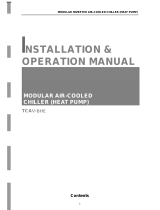
5
Controller Operation Instruction
2. Press or on the [Select] key to select the timing mode, the selected timing mode is
displayed on a black background; press or on the [Modify] key to switch among
Week/Cycle/Day/Timing Disabled modes. Upon the completion of setting, press the [Exit] key to
return to the previous interface, and the system completes the setting and adjustment of timing
mode.
3. When you press or on the [Select] key to select the set timing item, the set timing is
displayed on a black background; you may press the [Ok] key to enter the timing setting interface:
a. If Week Timing mode is selected, the following interface will be displayed. You may press or
on the [Select] key to select Scheduled Startup/Shutdown from Monday to Sunday and over
two periods a day, the selected setting is displayed on a black background, and you can press
or on the [Modify] key to change the time. Upon the completion of setting, press the [Exit] key
to return to the previous interface, the setting and adjustment of Week Timing mode is finished.
Detailed steps are as follows:
Press or on the [Select] key to select a timing item, the setting item selected by the cursor is
displayed on a black background, and then press or on the [Modify] key to set the time; the set
time is increased or decreased by one minute for each press of or on the [Modify] key, until the
number is 60, the time is increased or decreased by a hour; the display of “--:--” means invalid timing.
When the setting of four columns on this interface is finished, press or on the [Select] key
again to enter next interface and set relevant items in the same way; and press the [Exit] key to return to
previous interface after the setting completion.
Upon the setting completion, the system unit will always start up or shut down at scheduled times set in
the Week Timing mode.
Note: when you press the [Modify] key for one second, the set time will continuously increase or
decrease.
Interface of Week Timing
mode
Startup on Monday 1: 00 :00
Shutdown on Monday 1: 01 :00
Startup on Monday 2: 02: 00
Shutdown on Monday 2: 03 :00
Startup on Tuesday 1: --:--
Shutdown on Tuesday 1: --:--
Startup on Tuesday 2: --:--
Shutdown on Tuesday 2: --:-- - - - - - -
Startup on Sunday 1: --:--
Shutdown on Sunday 1: --:--
Startup on Sunday 2: --:--
Shutdown on Sunday 2: --:--
b. If the Cycle Timing mode is selected, the following interface will be displayed. When you press
or on the [Select] key to select set items, the selected setting column is displayed on a black
background; and then you may press or on the [Modify] key again to set the time. Upon
the completion of setting, press the [Exit] key to return to the previous interface, the setting and
adjustment of Cycle Timing mode is finished.
Upon the setting completion, the system unit will start up or shut
down at scheduled times set in the Cycle Timing mode on daily basis.
Interface of Cycle Timing
mode
Scheduled Startup 1: --:--
Scheduled Shutdown 1: --:--
Scheduled Startup 2: --:--
Scheduled Shutdown 2: --:--
c. If the Day Timing mode is selected, the following interface will be displayed. When you press or
on the [Select] key to select set items, the selected setting column is displayed on a black
background; and then you may press or on the [Modify] key again to set the time. Upon
the completion of setting, press the [Exit] key to return to previous interface.
After the function of the Day Timing mode is enabled, the
system exits the timing function.
Interface of Day Timing mode
Scheduled Startup 1: --:--
Scheduled Shutdown 1: --:--
Scheduled Startup 2: --:--
Scheduled Shutdown 2: --:--
d. If the Timing Disabled mode is selected, the system will disable the timing function, and you can not
enter the timing setting interface.




















